The Out In Africa South African Gay and Lesbian Film Festival (OIA) is a gay and lesbian film festival launched in 1994 to celebrate the inclusion, in the South African Constitution, of the clause prohibiting discrimination on the grounds of sexual orientation. The Festival set out to address the lack of visibility of Lesbian, Gay, Bisexual, Transgender and Intersex individuals (LGBTIs) in South African social and cultural life after decades of apartheid repression, to counter negative images of LGBTIs that prevail in traditional and religious communities, and to serve as a platform for discussion and debate about the situation of LGBTIs in a newly founded democracy.
The festival runs annually in Johannesburg and Cape Town, with smaller "satellite" film festivals in other towns as part of an outreach programme. [1] [2]
Films are sometimes followed by question and answer sessions or panel discussions after the screenings of select films. The festival runs for around 20 days each year, in either late September, October, or early November.
Local and international films and shorts are screened, ranging in genre from drama and comedy to documentaries. Many of the films shown have won multiple international awards. [3]
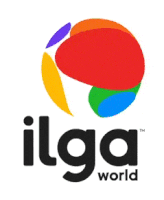
The International Lesbian, Gay, Bisexual, Trans and Intersex Association (ILGA) is a LGBTQ+ rights organization.

LGBT tourism is a form of tourism marketed to gay, lesbian, bisexual, and transgender (LGBT) people. People might be open about their sexual orientation and gender identity at times, but less so in areas known for violence against LGBT people.

The National LGBT Chamber of Commerce (NGLCC) is a U.S. not-for-profit advocacy group that aims to expand the economic opportunities and advancement of the LGBT business community. Its headquarters are in NW in Washington, D.C. NGLCC is the exclusive certifying body for LGBT-owned businesses known as LGBT Business Enterprises (LGBTBEs), and advocates for LGBT business inclusion in corporate and government supplier diversity programs. In October 2017, the organization changed its name from the National Gay & Lesbian Chamber of Commerce to National LGBT Chamber of Commerce to better reflect the entire LGBT business community it serves.

Lesbian, gay, bisexual, and transgender (LGBT) people in Kenya face significant challenges not experienced by non-LGBT residents. Sodomy is a felony per Section 162 of the Kenyan Penal Code, punishable by 21 years' imprisonment, and any sexual practices are a felony under section 165 of the same statute, punishable by 5 years' imprisonment. On 24 May 2019, the High Court of Kenya refused an order to declare sections 162 and 165 unconstitutional. The state does not recognise any relationships between persons of the same sex; same-sex marriage is banned under the Kenyan Constitution since 2010. There are no explicit protections against discrimination on the basis of sexual orientation and gender identity. Adoption is restricted to heterosexual couples only.
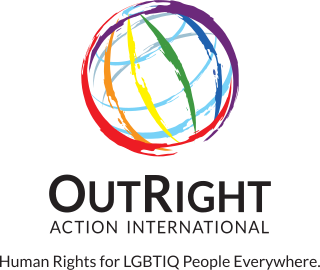
OutRight International (OutRight) is an LGBTIQ human rights non-governmental organization that addresses human rights violations and abuses against lesbian, gay, bisexual, transgender and intersex people. OutRight International documents human rights discrimination and abuses based on their sexual orientation, gender identity, gender expression and sex characteristics in partnership with activists, advocates, media, NGOs and allies on a local, regional, national and international level. OutRight International holds consultative status with ECOSOC.

Lesbian, gay, bisexual, and transgender (LGBT) people in Albania face legal challenges not experienced by non-LGBT residents, although LGBT people are protected under comprehensive anti-discrimination legislation. Both male and female same-gender sexual activities have been legal in Albania since 1995, but households headed by same-sex couples are not eligible for the same legal protections available to opposite-gender couples, with same-sex unions not being recognized in the country in any form.

Lesbian, gay, bisexual, and transgender (LGBT) people in Armenia face legal and social challenges not experienced by non-LGBT residents, due in part to the lack of laws prohibiting discrimination on the grounds of sexual orientation and gender identity and in part to prevailing negative attitudes about LGBT persons throughout society.
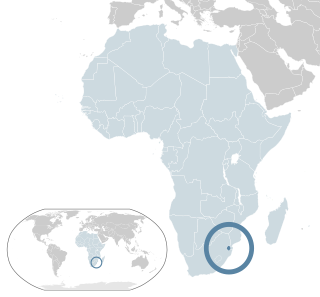
Lesbian, gay, bisexual, and transgender (LGBT) people in Eswatini have limited legal rights. According to Rock of Hope, a Swati LGBT advocacy group, "there is no legislation recognising LGBTIs or protecting the right to a non-heterosexual orientation and gender identity and as a result [LGBT people] cannot be open about their orientation or gender identity for fear of rejection and discrimination". Homosexuality is illegal in Eswatini, though this law is in practice unenforced. According to the 2021 Human Rights Practices Report from the US Department of State, "there has never been an arrest or prosecution for consensual same-sex conduct."
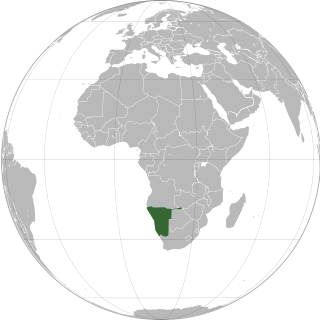
Lesbian, gay, bisexual, and transgender (LGBT) people in Namibia have limited legal protections. Sexual contact between men is criminalised within Namibia, although this law is generally unenforced. Discrimination based on sexual orientation is banned in Namibia but not for gender identity.
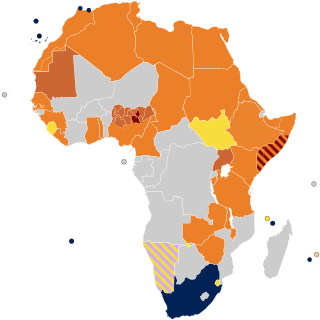
Lesbian, gay, bisexual, and transgender (LGBT) rights in Africa are in most countries very poor in comparison to the Americas, Western Europe and Oceania.

Discussions of LGBT rights at the United Nations have included resolutions and joint statements in the United Nations General Assembly and the United Nations Human Rights Council (UNHRC), attention to the expert-led human rights mechanisms, as well as by the UN Agencies.
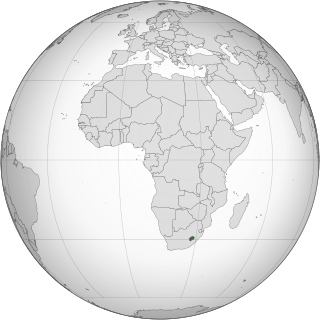
Lesbian, gay, bisexual, and transgender (LGBT) people in Lesotho face legal challenges not experienced by non-LGBT residents. Lesotho does not recognise same-sex marriages or civil unions, nor does it ban discrimination on the basis of sexual orientation or gender identity.
Corrective rape, also called curative rape or homophobic rape, is a hate crime in which somebody is raped because of their perceived sexual orientation. The common intended consequence of the rape, as claimed by the perpetrator, is to turn the person heterosexual.

Kasha Jacqueline Nabagesera is a Ugandan LGBT rights activist and the founder and executive director of the LGBT rights organization Freedom & Roam Uganda (FARUG). She received the Martin Ennals Award for Human Rights Defenders in 2011 and the Right Livelihood Award in 2015.

White Paper is a 2010 Iranian animated short film about LGBT rights and homophobia, directed by Seyed Mohsen Pourmohseni Shakib. It is director's debut short animation.
Funeka Soldaat is a lesbian community activist from South Africa, who works with the Triangle Project and is a founder of Khayelitsha-based lesbian advocacy group, Free Gender. Both of which are non-profit, non-governmental organizations that benefit LGBTI individuals in South Africa. A survivor of corrective rape, she advocates against gender violence and homophobia in her country. Soldaat spoke to a Khayelitsha commission of inquiry in January 2014 about the 1995 rape.

There have been pride parades in South Africa celebrating LGBT pride since 1990. South African pride parades were historically used for political advocacy protesting against legal discrimination against LGBT people, and for the celebration of equality before the law after the apartheid era. They are increasingly used for political advocacy against LGBT hate crimes, such as the so-called corrective rape of lesbians in townships, and to remember victims thereof.
This is a timeline of notable events in the history of non-heterosexual conforming people of African ancestry, who may identify as LGBTIQGNC, men who have sex with men, or related culturally specific identities. This timeline includes events both in Africa, the Americas and Europe and in the global African diaspora, as the histories are very deeply linked.
Taghmeda Achmat, commonly known as Midi Achmat, is one of South Africa's most well known lesbian activists. Achmat co-founded the Treatment Action Campaign (TAC) with her partner and fellow activist Theresa Raizenberg on 10 December 1998.

GALZ An Association of LGBTI People in Zimbabwe is an organisation established in 1990 in Harare to serve the needs of the lesbian, gay, bisexual, transgender and intersex (LGBTI) community in Zimbabwe. GALZ's vision is "a just society that promotes and protects human rights of LGBTI people as equal citizens in Zimbabwe".